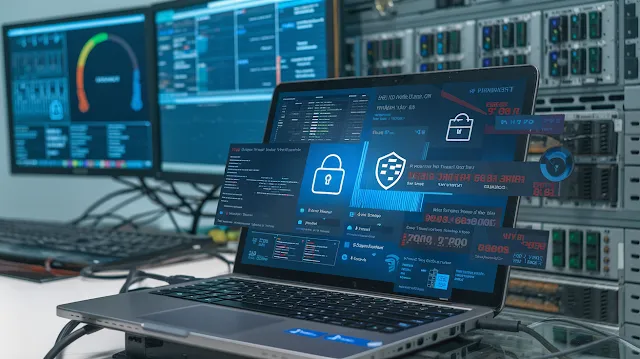Cyber safety is vital in our increasing number of virtual internationals. Protecting personal and expert facts from cyber threats is important for maintaining privacy and safety. Choosing a first-rate computer for cyber security is a massive step in safeguarding your data. This journey manual will explore why having a steady computer subject and provide nine key insights to help you make a knowledgeable decision. Whether you're a tech enthusiast or an informal user, knowledge of the importance of cyber security and the functions of a reliable laptop is vital.
Section 1: Understanding Cyber Security
Cyber Security Defined Cyber protection entails protecting structures, networks, and facts from cyber assaults. It guarantees the confidentiality, integrity, and availability of statistics. With the rise of online threats, cyber protection has become more crucial than ever.
Common Cyber Threats and Vulnerabilities Cyber threats include viruses, malware, phishing attacks, and ransomware. These threats can compromise private records, economic data, and business operations. Understanding these vulnerabilities helps in taking preventive measures.
The Role of a Reliable Laptop A dependable laptop is your first line of protection against cyber threats. It lets in you run safety software correctly and guard your information. Investing in a great computer for cyber safety ensures you've got the tools needed to live securely on line.
Section 2: Key Features of the Best Laptop for Cyber Security
Subsection 1: Processing Power
Importance of High Processing Power High processing power is crucial for running security software smoothly. It ensures that your laptop can handle resource-intensive tasks without lag. A powerful processor helps in maintaining robust cyber security measures.
Recommended Specifications Look for laptops with at least an Intel i5 or AMD Ryzen 5 processor. Higher-end models like Intel i7 or Ryzen 7 offer even better performance. These specifications ensure your laptop can run multiple security applications efficiently.
Subsection 2: Operating System
Comparison of Operating Systems Different operating systems offer varying levels of security. Windows, macOS, and Linux each have their strengths and weaknesses. Understanding these can help you choose the best OS for your cyber security needs.
Pros and Cons of Each OS
Windows: Widely used, but more targeted by malware.
macOS: Known for strong security features but less customizable.
Linux: Highly secure and customizable but may require technical know-how.
Subsection 3: Storage and Memory
Importance of Sufficient Storage and RAM Adequate storage and RAM are vital for running security applications effectively. Insufficient memory can slow down your laptop and compromise security.
Recommended Storage and Memory Specifications Aim for at least 256GB SSD and 8GB RAM. For better performance, opt for 512GB SSD and 16GB RAM. These specifications ensure your laptop can handle large security databases and run multiple applications simultaneously.
Section 3: Hardware Security Features
Overview of Essential Hardware Security Features Hardware security features add an extra layer of protection against cyber threats. These features help safeguard your laptop from unauthorized access and data breaches.
Biometric Authentication Biometric authentication, such as fingerprint scanners and facial recognition, enhances security. These methods are more secure than traditional passwords and protect against unauthorized access.
Hardware-Based Encryption Hardware-based encryption secures your data at the hardware level. It prevents unauthorized access, even if your laptop is lost or stolen. Look for laptops with built-in encryption features.
Section 4: Software and Security Tools
Essential Security Software Installing essential security software is crucial for protecting your laptop. This software helps detect and prevent cyber threats, ensuring your data remains safe.
Recommendations for Antivirus, Anti-Malware, and Firewall Programs
Antivirus: Norton, Bitdefender
Anti-Malware: Malwarebytes, Spybot
Firewall: ZoneAlarm, GlassWire
Importance of Regular Software Updates and Patches Regular updates and patches fix vulnerabilities and improve safety. Ensure your running system and protection software are updated to guard against the trendy threats.
Section 5: Network Security
Importance of Secure Internet Connections Secure net connections are critical for shielding your data online. Unsecured networks can divulge your records to cyber threats. Always use steady connections while having access to the net.
Recommendations for Using VPNs and Secure Wi-Fi Networks
VPNs: NordVPN, ExpressVPN
Secure Wi-Fi: WPA3 encryption, strong passwords
Tips for Securing Home and Public Networks
Use strong, unique passwords for your Wi-Fi network.
Enable network encryption.
Avoid using public Wi-Fi for sensitive transactions.
Section 6: User Practices for Enhanced Cyber Security
Best Practices for Maintaining Laptop Security Adopting best practices helps maintain your laptop's security. These practices protect against common cyber threats and ensure your data remains safe.
Importance of Strong Passwords and Multi-Factor Authentication Strong passwords are your first line of defense against unauthorized access. Use a mix of letters, numbers, and symbols. Multi-factor authentication adds an extra layer of security.
Tips for Safe Browsing and Avoiding Phishing Scams
Avoid clicking on suspicious links.
Verify the sender's email address before opening attachments.
Use a secure browser with anti-phishing features.
Section 7: Case Studies and Expert Insights
Real-World Examples of Cyber Attacks and Their Impact Examining real-world cyber attacks highlights the importance of cyber security. These examples show the potential damage caused by security breaches and the need for robust protection.
Insights from Cyber Security Experts on Choosing the Best Laptop Experts recommend choosing laptops with strong security features and reliable performance. Consider their advice when selecting the best laptop for your needs.
Lessons Learned from These Case Studies Learning from past cyber attacks can help prevent future incidents. Understand the common vulnerabilities and take steps to address them.
Conclusion
Incorporating urban adventures into travel plans enriches the adventure by supplying cultural immersion, spontaneous discoveries, and unique stories. Exploring towns unveils hidden gemstones, fosters a non-public boom, and deepens connections with locations. Embrace city exploration to create your very own captivating journey stories, discovering the colorful pulse of each town you go to. Happy exploring!

